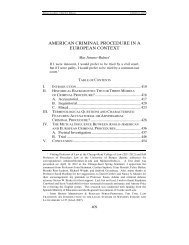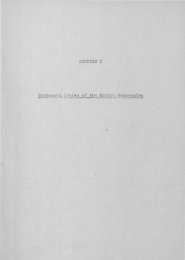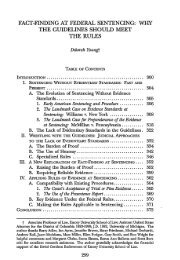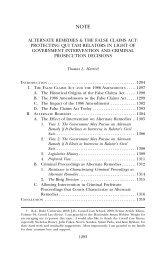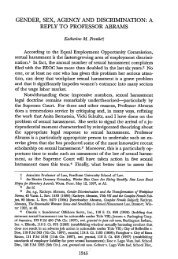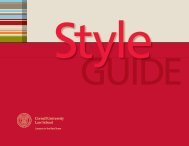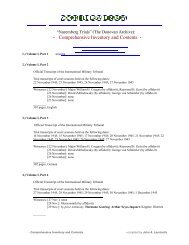JUDICIAL CLERKSHIP HANDBOOK - Cornell University Law School
JUDICIAL CLERKSHIP HANDBOOK - Cornell University Law School
JUDICIAL CLERKSHIP HANDBOOK - Cornell University Law School
You also want an ePaper? Increase the reach of your titles
YUMPU automatically turns print PDFs into web optimized ePapers that Google loves.
INTRODUCTION<br />
Clerking for a judge or for a court is a unique experience, as is the process of applying for a<br />
clerkship. The faculty Judicial Clerkship Committee and the Office of Public Service<br />
developed this handbook as a guide to the wide variety of clerkship opportunities and their<br />
application procedures. Your first step in approaching the clerkship application process is to<br />
read this handbook! You should also attend the clerkship information programs held during<br />
the spring semester (watch Scoops for specific dates and times.) We will try to have these<br />
programs videotaped. Organize your thoughts by completing the Clerkship Application<br />
Worksheet, Appendix A, and then seek advice from Clerkship Committee members:<br />
Professors Blume, Farina, Liivak, Mollenkamp, Penalver and Wendel, Deans Lukingbeal,<br />
Comstock, and DeRosa, and Elizabeth Peck, Director of Public Service. Do not forget that<br />
other faculty members who have clerked can be valuable resources as well ‐ see Appendix<br />
B.<br />
OVERVIEW OF THE JOB AND THE OPTIONS<br />
<strong>Law</strong> clerks have been a vital part of the judiciary for more than a century. Titles and duties<br />
have varied throughout history; indeed, a law clerk=s duties have never been statutorily<br />
defined. It has been observed that no two judges use their clerks in precisely the same<br />
manner, but generally speaking, a law clerk=s fundamental duty is to assist the judge (or<br />
judges) with the disposition of cases. Typical tasks include legal research, drafting, editing,<br />
proofreading, preparing bench memos, analyzing issues before the court, reviewing papers<br />
and briefing the judge. A clerk may also be responsible for library maintenance, document<br />
assembly, and, if the clerk is working for a trial judge, he or she may assist at trials and other<br />
courtroom procedures.<br />
Judicial clerkships are available in federal, state and municipal courts across the country. In<br />
the federal courts of appeals, the federal district courts and the state appellate and trial<br />
courts, law clerks work on a wide range of civil and criminal issues. Specialized courts such<br />
as the U.S. Bankruptcy Court, the U.S. Tax Court, and the New York State Supreme Court,<br />
Commercial Division also provide quality clerkship opportunities. In specialized courts the<br />
range of issues addressed is narrower, but the experience can be especially interesting if<br />
you plan to specialize in that particular practice area.<br />
On the federal level, a general provision for each court authorizes the hiring of law clerks,<br />
and the number of clerks is set in the annual judicial appropriations act. At present, each<br />
Supreme Court justice is authorized four law clerks; each circuit judge, three; each district<br />
judge, two; each magistrate judge, one; and each bankruptcy judge, one or two. Senior<br />
judges have an allotment of clerks based on the caseload they choose to carry. The<br />
majority of these clerkships are one‐year positions. However, a significant number of<br />
federal judges prefer two‐year clerkships (especially in district courts), which allows a clerk<br />
in his or her second year to train a successor. Also, some judges (especially magistrate<br />
judges) will opt for a permanent, or Acareer,@ clerk and so many do no hiring in the normal<br />
clerkship season. Some federal agencies have clerkship opportunities as well. Additionally,<br />
1 | P age




